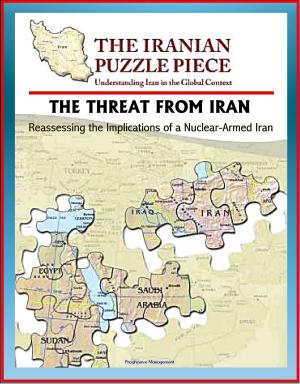21st Century Peacekeeping and Stability Operations Institute (PKSOI) Papers - A Case Study in Security Sector Reform: Learning from Security Sector Reform / Building in Afghanistan
Nonfiction, History, Middle East, Military| Author: | Progressive Management | ISBN: | 9781310292514 |
| Publisher: | Progressive Management | Publication: | November 28, 2013 |
| Imprint: | Smashwords Edition | Language: | English |
| Author: | Progressive Management |
| ISBN: | 9781310292514 |
| Publisher: | Progressive Management |
| Publication: | November 28, 2013 |
| Imprint: | Smashwords Edition |
| Language: | English |
This PKSOI Paper is designed to further the U.S. and other interested international governments' understanding of how Security Sector Reform (SSR) was conducted in Afghanistan from 2002 to 2003. This was America's first attempt at conducting formalized SSR, so it offers readers an opportunity to learn whom the United States saw as key actors in the process, what institutions were slated for reform, and how well the United States and its partners met the typical challenges of SSR.
The author rightly points out the synergy that was lost because of a lack of coordination and understanding between government officials and nongovernmental organizations like aid groups, academia, and think tanks. This deficiency became one of my focal points as I started to build my team in Afghanistan.
The lessons learned from this endeavor were useful to me as I developed my strategy for helping the Afghans make their country a secure and stable state. The author's experience revealed many pitfalls in security sector building and international team-building that we are trying to avoid today.
Finally, this paper provides a case study to help explain the SSR concepts that were recently formalized in U.S. Army Field Manual 3.07, Stability Operations Doctrine. It provides insights into how the military interacts with host-nation governments, the United Nations, the State Department, and national embassies to solve today's complex problems.
Security sector reform (SSR) is that set of policies, plans, programs, and activities that a government undertakes to improve the way it provides safety, security, and justice. This is a complex and involved task against which Captain Howk evaluates the early international effort to rebuild effective governance in Afghanistan. The purpose of this case study is to document the lessons learned through the development and execution of the SSR program in Afghanistan, with special emphasis from 2002 through 2003. The author has a unique and enviable position from which to observe the inner workings of the highest level commands in Afghanistan—first as an Aide de Camp to then Major General Karl Eikenberry during his first tour in Afghanistan and as the current Aide de Camp to General Stanley McChrystal.
This paper is not only a case study, but in effect is a primer on SSR. It critically evaluates the underlying theories of SSR and discusses how SSR should work in an operational environment. The paper concludes by reexamining the development of the strategy and implementation of the SSR effort in Afghanistan. By 2002 it was clear that SSR was an important focus, and it was recognized to be essential for the successful development of economic and governance institutions in Afghanistan.
This PKSOI Paper is designed to further the U.S. and other interested international governments' understanding of how Security Sector Reform (SSR) was conducted in Afghanistan from 2002 to 2003. This was America's first attempt at conducting formalized SSR, so it offers readers an opportunity to learn whom the United States saw as key actors in the process, what institutions were slated for reform, and how well the United States and its partners met the typical challenges of SSR.
The author rightly points out the synergy that was lost because of a lack of coordination and understanding between government officials and nongovernmental organizations like aid groups, academia, and think tanks. This deficiency became one of my focal points as I started to build my team in Afghanistan.
The lessons learned from this endeavor were useful to me as I developed my strategy for helping the Afghans make their country a secure and stable state. The author's experience revealed many pitfalls in security sector building and international team-building that we are trying to avoid today.
Finally, this paper provides a case study to help explain the SSR concepts that were recently formalized in U.S. Army Field Manual 3.07, Stability Operations Doctrine. It provides insights into how the military interacts with host-nation governments, the United Nations, the State Department, and national embassies to solve today's complex problems.
Security sector reform (SSR) is that set of policies, plans, programs, and activities that a government undertakes to improve the way it provides safety, security, and justice. This is a complex and involved task against which Captain Howk evaluates the early international effort to rebuild effective governance in Afghanistan. The purpose of this case study is to document the lessons learned through the development and execution of the SSR program in Afghanistan, with special emphasis from 2002 through 2003. The author has a unique and enviable position from which to observe the inner workings of the highest level commands in Afghanistan—first as an Aide de Camp to then Major General Karl Eikenberry during his first tour in Afghanistan and as the current Aide de Camp to General Stanley McChrystal.
This paper is not only a case study, but in effect is a primer on SSR. It critically evaluates the underlying theories of SSR and discusses how SSR should work in an operational environment. The paper concludes by reexamining the development of the strategy and implementation of the SSR effort in Afghanistan. By 2002 it was clear that SSR was an important focus, and it was recognized to be essential for the successful development of economic and governance institutions in Afghanistan.















